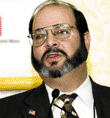Next two years rosy for fed IT

The federal information technology marketplace will be filled with contract opportunities during the next two years, but contractors seeking success in the rapidly growing market must focus on meeting individual agencies' needs rather than selling their own strengths.</FONT>

"I keep hoping [vendors] will walk in with the international terrorist phone book ? addresses and phone numbers. But they only have hardware and software." ? Jim Reid, director of architecture and systems engineering at the CIA
Henrick G. de Gyor

"We always have a need for female, minority-owned, small, disadvantaged business in a HUB zone with security clearance."? Bruce Brody, associate deputy assistant secretary for cybersecurity at the Veterans Affairs
Henrik G. de Gyor

From left, Roger Waldron and Mary Whitley, both of GSA, and Stephen Charles of immixGroup spoke about the procurement environment at FedFocus 2003.
Henrik G. de Gyor
Speaking at the FedFocus 2003 conference, put on by market research and consulting firm Input Inc., Chantilly, Va., government and industry officials said IT companies should look for growth in areas such as homeland security, e-government enterprise architecture and information assurance.
Input estimated the government will purchase about $40.3 billion in IT and services in fiscal 2003, growing to $44.7 billion in 2004, said Kevin Plexico, executive vice president. Fiscal 2003 began Oct. 1, though many departments and agencies are operating under continuing resolutions because Congress has yet to approve appropriations for them.
"We usually do a five-year focus, but this time it's on 12 to 24 months," Plexico said, because the market "is growing about twice as fast as [it did] five years ago."
President Bush has requested $52 billion in IT spending for fiscal 2003. Input's estimate included only the money that agencies are expected to spend purchasing IT goods and services from the private sector. Its market forecast does not include internal government IT spending, such as the salaries of government technology employees.
Spending by civilian agencies is expected to grow an average of 9 percent annually through fiscal 2004, from $19.3 billion in fiscal 2002 to $22.9 billion in 2004. But defense agencies' expenditures are estimated to grow even faster, by 11 percent per year on average, up from $17.8 billion in 2002 to $21.8 billion in 2004.
The Air Force, Navy, Army, the departments of Defense, Transportation (in-
cluding the Transportation Security Administration), Treasury, Health and Human Services, Justice and Agriculture, the proposed Homeland Security Department and NASA will represent 80 percent of federal IT spending in 2003, Plexico said.
In homeland security, vendors can help agencies identify solutions, while in e-government, vendors need to provide real solutions, not quick fixes, Plexico said.
Information assurance means including security as an aspect of every solution, while the key to enterprise architecture is focusing on interoperability and collaboration.
As for competitive sourcing, also known as outsourcing, aspiring providers can best help the government by helping to build the business case to justify the change, he said.
These views were supported by more than a dozen representatives from the Office of Homeland Security, General Services Administration, TSA, National Institute of Standards and Technology, Office of Management and Budget and other agencies who spoke at the conference.
Representatives from the CIA and Department of Veterans Affairs described some of the most common problems they face in dealing with IT companies, and offered advice on how contractors can turn opportunities into business.
"Buying software from most of your companies is worse than buying a used car," said Jim Reid, director of architecture and systems engineering at the CIA. Part of the problem is the wide variety of licensing schemes used throughout the industry, he said. In addition, software upgrades can cause data corruption and incompatibility from version to version.
Reid said the biggest headache is how companies impose their standards on agency processes by offering solutions that only work with data that gets structured into the vendor's proprietary format.
As for inflated claims of homeland security "solutions," Reid said: "I keep hoping they'll walk in with the international terrorist phone book -- addresses and phone numbers. But they only have hardware and software."
The CIA official said the agency wants vendors with trustworthy employees, including ex-employees. Companies must expect to have their staffs checked by the CIA, and understand the agency can reject particular employees for undisclosed reasons.
Reid also said the CIA is looking for corporate partners it can trust with the design and manufacture of products and who are responsive to problems.
Bruce Brody, the VA's associate deputy assistant secretary for cybersecurity, said his biggest aggravation comes from sales calls that are a waste of time. Cold calls and cold e-mails are dead ends, he said, and his own calendar is booked for months in advance, so a salesperson should be willing and able to speak to his subordinates.
Once a company is in the door, "don't bring point solutions," Brody said, such as standalone products that aren't interoperable or solutions that don't meet the agency's priorities. "We have enterprisewide problems. We want scalable solutions ... [and] please bring people who can answer questions and make commitments."
On the other hand, the VA is actively encouraging small businesses that have cybersecurity expertise to come forward.
"We always have a need for female, minority-owned, small, disadvantaged business in a HUB zone with security clearance," Brody said. *
Staff Writer Patience Wait can be reached at pwait@postnewsweektech.com.
NEXT STORY: Contract Roundup

